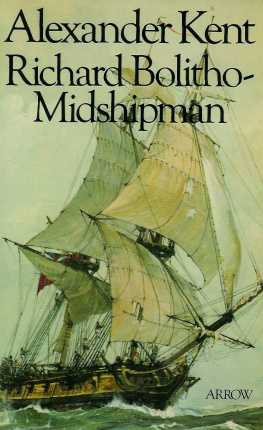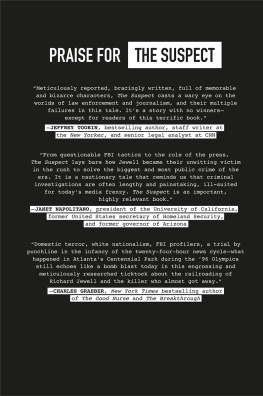Alexander Kent
Sword of Honour
(Bolitho 25)
To Chris Patten, a man of honour, in admiration
Sail forth steer for the deep waters only,
Reckless O soul, exploring, I with thee, and thou with me,
For we are bound where mariner has not yet dared to go,
And we will risk the ship, ourselves and all.
Vice-Admiral Sir Graham Bethune put down his pen and waited for the elderly Admiralty clerk to gather up the letters and despatches he had signed. As the tall double doors closed behind him, Bethune stood up and glanced at the nearest windows. Bright sunshine; he could even feel the warmth across the room, with a sky so clear that it was almost colourless.
He heard a clock chime, and wondered how the meeting was progressing along the passageway. Senior officers, lords of Admiralty, and civilian advisers who had been called here to discuss the state of the dockyards and the needs of the medical services. At the Admiralty, it was another ordinary day.
He moved restlessly to the window and opened it, and the sounds of London rose to greet him. The clatter of carriages and the jingle of harness, the cry of a street pedlar risking the wrath of Admiralty porters to sell his wares to the passing throng.
Bethune caught his own reflection in the window, and smiled. Once he had thought he would never hold such an appointment; now he could hardly imagine anything else. After ships and the sea, it had seemed like something foreign. He touched the front of his waistcoat. Graham Bethune, Vice-Admiral of the Blue, one of the youngest flag officers on the Navy List. Like the uniform, the appointment fitted him perfectly.
He leaned over the sill and watched the procession of people. Many of the carriages were open to the sunshine, revealing women in colourful hats and fine gowns. It was April of the year 1814, but the war was still a brutal fact.
Like most serving officers, Bethune had become accustomed to the exaggerated assurances and the promises of final victory.
Reports arrived daily with news that Wellington 's armies were breaking through one French strongpoint after another; the invincible Napoleon was claimed to be on the run, deserted by all but his faithful marshals and his Old Guard.
What did all those people down there really believe, he wondered. After so many years of war with the familiar enemy, was the prospect of peace still only a dream? He moved back into the room and stared at the painting on one wall, a frigate in action, sails pitted with shot, a full broadside spitting fire at the enemy. It was Bethune's last command. He had confronted two big Spanish frigates, unfortunate odds even for a captain as eager as he had been. After a brisk engagement, he had run one Spaniard ashore and captured the other. Flag rank had followed almost immediately.
He looked at the ornate clock with its simpering cherubs and thought of the one man he admired, perhaps envied, more than any other.
Sir Richard Bolitho was back in England, fresh from that other war with the United States; Bethune had seen the letter the First Lord of the Admiralty had sent to him in Cornwall, recalling him to London. Bolitho had been his captain all those years ago in the sloop-of-war Sparrow. Another war, but they had been fighting Americans even then, a new nation born of revolution.
No reason for the recall had been offered. Surely Sir Richard Bolitho deserved a rest after all he had done? He thought, too, of the lovely Catherine Somervell, who had come to this very office to see him. He often thought of them, together.
And when the impossible had come to pass, and there was peace again, permanent or not, what would happen to Bolitho, and to all the men he had known on his way up the ladder from midshipman's berth to Admiralty? What will happen to me? It was the only life he knew. It was his world.
The streets and seaports were full of crippled and tattered remnants of war, rejected by a life which had all but destroyed them. Bethune was sometimes surprised that he could still be sensitive about such matters. Perhaps he had inherited that trait, too, from Sparrow's youthful captain.
He heard voices in the adjoining room, where his clerk held unwanted visitors at bay. He looked at the clock again. Too early for a glass.
Bethune did not drink heavily or overeat; he had seen too many of his contemporaries deteriorate because they did not heed such things. He took exercise when he could, a luxury after a ship's restricted quarters, and he enjoyed the company of women, as much as they enjoyed his. But he was discreet, or tried to be, and he told himself it was for the sake of his wife and his two young children.
His servant was standing in the doorway.
Bethune sighed. "What is it, Tolan?"
"Captain McCleod is here to see you, sir."
Bethune looked away. "Ask him to come in."
What had made him so nervous? Guilt? Thinking perhaps of Bolitho's mistress, who had faced the scandal and had triumphed?
The tall captain entered the room. He had an impassive, melancholy face; Bethune could not imagine him at sea, fighting a gale or the enemy.
"More despatches?"
The captain shook his head. Even that seemed mournful. "From Portsmouth, sir. By telegraph, just received." He glanced at the ceiling as if to see through it to the device which could link the Admiralty building to the south coast more swiftly than any courier, faster than any horse, provided the weather was perfect, as it was today.
Bethune opened it, and then hesitated. It was round, schoolboy writing, but afterwards he thought it was as though each word had been written in fire. Or blood.
He strode past his servant and the clerk at his desk, his steps seeming unusually loud in the deserted corridor. Great paintings watched him pass, sea battles: courage and heroism, without the human agony which was so seldom shown.
A lieutenant jumped to his feet. "I'm sorry, sir, but the meeting is still in progress!"
Bethune did not even see him. He thrust open the door, and watched the mingled expressions of surprise, irritation, perhaps alarm.
The First Lord frowned. "Is it so urgent, Graham?"
Bethune wanted to lick his lips, to laugh, to weep. He had felt nothing like it before.
"From the admiral commanding at Portsmouth, my lord. A despatch has just been received."
The admiral said evenly, "Take your time."
Bethune tried again. It was a great moment, and he was a part of it, and yet all he could feel was sadness. "Marshal Soult's army was defeated by the Duke of Wellington at Toulouse. Totally. Napoleon has abdicated, surrendered to the Allies, four days ago."
The admiral stood, very slowly, and looked around the table. "Victory, gentlemen." The word seemed to hang in the air. "If only brave Nelson could have seen it."
Then he turned to Bethune. "I shall see the Prince Regent immediately. Attend to it for me." He dropped his voice to exclude the others. "It could mean Paris for you, Graham. I would feel more secure with you there."
Bethune found himself back in his spacious office again, without remembering the return.
When he looked out of the window once more, nothing had changed, not the people nor the horses and carriages. Even the pedlar was still standing with his tray of wares.
The elderly clerk was hovering by the desk. "Sir?"
"Pass the word to the Officer-of-the-Guard for the First Lord's carriage and escort."
"At once, sir." He hesitated. "Difficult to accept, sir. To believe.."
Bethune smiled and touched his arm, even as Bolitho might have done.
Difficult to accept? It was impossible.
Lieutenant George Avery reined his hired mount to a halt and leaned back in the saddle to admire the view. The house was beautifully designed; magnificent was the only description, he thought, and probably larger than the one where he had spent the night.




